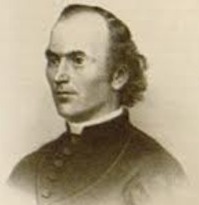 Gettysburg Inspiration, Father William Corby, is not only remembered for his courage and fearlessness under fire, but will always be heralded as the Union Patriot Priest, who gave general absolution, to hundreds of soldiers, Catholic or not, on the bloody battlefield at Gettysburg, on July 2, 1863. Although Father Corby accompanied his men on many battlefields, giving comfort to the wounded and absolution to the dying, perhaps his greatest moment came at Gettysburg. Little more than 500 men remained of the original 3,000 veterans of the 88th New York in Brigadier General Thomas Meagher’s legendary Irish Brigade and now Meagher’s famous troopers were being ordered to rescue the imperiled Union flank in a vicious confrontation that would become known to history as, The Wheatfield.
Gettysburg Inspiration, Father William Corby, is not only remembered for his courage and fearlessness under fire, but will always be heralded as the Union Patriot Priest, who gave general absolution, to hundreds of soldiers, Catholic or not, on the bloody battlefield at Gettysburg, on July 2, 1863. Although Father Corby accompanied his men on many battlefields, giving comfort to the wounded and absolution to the dying, perhaps his greatest moment came at Gettysburg. Little more than 500 men remained of the original 3,000 veterans of the 88th New York in Brigadier General Thomas Meagher’s legendary Irish Brigade and now Meagher’s famous troopers were being ordered to rescue the imperiled Union flank in a vicious confrontation that would become known to history as, The Wheatfield.
Father Corby was born in Detroit on October 2, 1833 to Daniel, a native of King’s County, Ireland and Elizabeth, a citizen of Canada. Daniel became a prominent real estate dealer and one of the wealthiest landed proprietors in the country. He helped to found many Detroit parishes and aided in the building of many churches. His son William was educated in the common schools until he was sixteen and then joined his father’s business for four years. Realizing that William had a calling to the priesthood and a desire to go to college, Daniel sent him and his two younger brothers to the ten-year old university of Notre Dame in South Bend, Indiana.
After graduation, Corby returned to the school as a faculty member. During the Civil War, he volunteered his services as a chaplain in the Union Army at the request of Father Sorin, who was the Superior-General of the Congregation of the Holy Cross. Corby resigned his professorship at Notre Dame and was assigned as chaplain to the 88th New York Volunteer Infantry.
While many Protestant churches split over the issues of secession and slavery, the Catholic Church took no official stand on the war. Bishops in both North and South supported their troops. Catholic young men followed suit, joining both the Union and Confederacy. Several dozen priests served as chaplains in both armies, and over six hundred religious women ministered to the sick and dying in hospitals. Their work did much to reduce the anti-Catholicism that had flourished in the pre-war era.
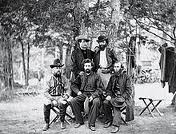 For the next three years, Father Corby ministered to the troops with great enthusiasm. According to the Catholic Cultural Society,
For the next three years, Father Corby ministered to the troops with great enthusiasm. According to the Catholic Cultural Society,
“Chaplains, like officers, won the common soldiers’ respect with their bravery under fire. Father Corby’s willingness to share the hardships of the men with a light-hearted attitude and his calm heroism in bringing spiritual and physical comfort to men in the thick of the fighting won him the esteem and the friendship of the men he served. Frequently under fire, Corby moved among casualties on the field, giving assistance to the wounded and absolution to the dying. For days after the battles, he inhabited the field hospitals to bring comfort to men in pain.”
Death, played a major role in life in the Army of the Potomac during Corby’s three years with the troops. The priest was a witness to many men about to meet their God. His supreme respect for the sanctity of life stands out in his memoirs. After the gruesome 1862 battle at Antietam, Corby wrote:
“The field presented a sickening sight the day after the battle on September 18, 1862, Meagher’s brigade did its duty as a military body and received the highest commendation from Gen. McClelland and from many historians since”.
Known for their glorious and bloody charge at Fredericksburg, the Irish Brigade also made a gallant stand at Gettysburg. The Catholic Cultural Society recalls this as the defining moment for both the brigade and their chaplain:
“Before the Brigade engaged the Confederate soldiers at a wheat field just south of Gettysburg, Father William Corby, in a singular event that lives in the history of the Civil War, addressed the troops. Placing his purple stole around his neck, Corby climbed atop a large boulder and offered absolution to the entire unit, a ceremony never before performed in America. Kohl, editor of Corby’s memoirs, tells us that Father Corby sternly reminded the soldiers of their duties, warning that the Church would deny Christian burial to any who wavered and did not uphold the flag. The members of the Brigade were admonished to confess their sins in the correct manner at their earliest opportunity.”
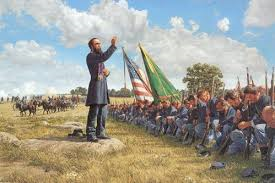 Father Corby’s address to the soldiers before their combat states,
Father Corby’s address to the soldiers before their combat states,
“My Dear Christian Friends! In consideration of the want of time for each one to confess his sins in due order as required for the reception of the sacrament of Penance, I will give you general absolution. But, my dear friends, while we stand here & in the presence of Eternity, so to speak, with a well-armed force in front & with missiles of death in the form of shells bursting over our heads, we must humble ourselves before the great Creator of all men & acknowledge our great unworthiness & conceive a heartfelt sorrow for the sins by which we have ungratefully offended the Divine Author of all good things. Him Whom we ought to love, we have despised by sinning against his laws. Him Whom we should have honored by lives of virtue, we have dishonored by sin.”
“We stand in debt to our great Lord & Master. He loves us but we, by sin, have forfeited that love. Now, to receive a full pardon for our sins & regain the favor of God, do not think it is sufficient to get the priest’s absolution. It is true as a minister of God he has recd the power to pronounce your sins absolved. ‘Whose sins you shall forgive they are forgiven’ – John 20, 23 – by virtue of this power given the Apostles & their lawful successors, the priest acts. But the absolution – pronounced by the priest or by St Peter himself – would be worthless unless the penitent conceives a true sorrow for his sins. Which sorrow should include a firm determination never more to willfully offend & to do all in his power to atone for the past sins. Therefore, my dear friends, in the solemn presence of Eternity, excite in your minds a deep sorrow for all the sins, negligence, & transgressions of your past lives. ‘Rend your hearts & not your garments,’ & I the consecrated minister of God will give you general absolution.”
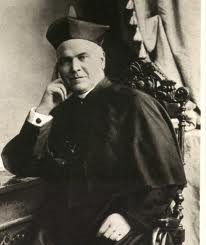 After seeing service in some of the war’s hardest battles during three years with the Irish Brigade, Father Corby returned to Notre Dame in the fall of 1864. He served twice as president of the university, taught there, and stayed there for most of his remaining years. But the war had been a defining moment in his life.
After seeing service in some of the war’s hardest battles during three years with the Irish Brigade, Father Corby returned to Notre Dame in the fall of 1864. He served twice as president of the university, taught there, and stayed there for most of his remaining years. But the war had been a defining moment in his life.
At Notre Dame he established a veterans’ post for ex-soldiers on the faculty. In 1893, he published Memoirs of Chaplain Life: Three Years with the Irish Brigade in the Army of the Potomac. He wrote it, in part, to counteract a resurgent anti-Catholicism and partly to encourage Catholics.
In 1893 his veterans nominated Corby for the Medal of Honor, noting that “no spot was too dangerous or too much exposed to the fire of the enemy.” Although he never received the medal, the veterans of the brigade presented him with a chalice that he would always cherish.
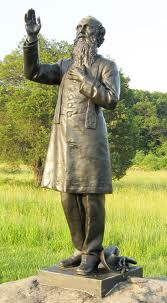 Father Corby died on December 28, 1897. His coffin was wrapped in a regimental flag and followed by a group of veterans. A volley was fired over the grave, and a bugler played Taps. He was laid to rest, at the Holy Cross Cemetery at the University of Notre Dame. Two bronze statues memorialize Corby, one stands at Gettysburg, near the Wheat Field and a copy of this memorial is located outside Corby Hall at the University of Norte Dame. In his memoir, Corby wrote,
Father Corby died on December 28, 1897. His coffin was wrapped in a regimental flag and followed by a group of veterans. A volley was fired over the grave, and a bugler played Taps. He was laid to rest, at the Holy Cross Cemetery at the University of Notre Dame. Two bronze statues memorialize Corby, one stands at Gettysburg, near the Wheat Field and a copy of this memorial is located outside Corby Hall at the University of Norte Dame. In his memoir, Corby wrote,
“Oh you of a younger generation, think what it cost your forefathers to save our glorious inheritance of union and liberty! If you let it slip from your hands you will deserve to be branded as ungrateful cowards and undutiful sons. But, no! You will not fail to cherish the prize—it is too sacred a trust—too dearly purchased.”
Gettysburg Inspiration, Father William Corby, was not only a Patriot Priest, but shared his unwavering bravery and illumination with thousands of soldiers during the Civil War.
Bummer


07/03/13 Bummer-
FYI…
“Caps flew off heads “and the entire (Irish) Brigade”- including the smattering of (Ulster) Protestants in the ranks-“knelt from ‘Parade rest’…on the right knee with musket erect in the right hand.” (Out of the corner of his eye, Corby could see that the luxuriantly profane Hancock had “removed his hat” and “bowed in reverential devotion.” Dominus noster Jesus Christus vos absolvat, Corby intoned, and even before he could finish, “the order came to move.” Shortly after “just six o’clock”, Patrick Kelly’s Irish Brigade and Edward Cross’s Brigade smashed into Zook’s Brigade composed of the 3rd, 7th, 15th SC regiments.
Source” Gettysburg, The Last Invasion, Author Allen C. Guelzo,2013, p. 291.
Greetings John,
As usual, a perfect addition to the post. Corby was a fascinating character. Thanks for the read.
Bummer